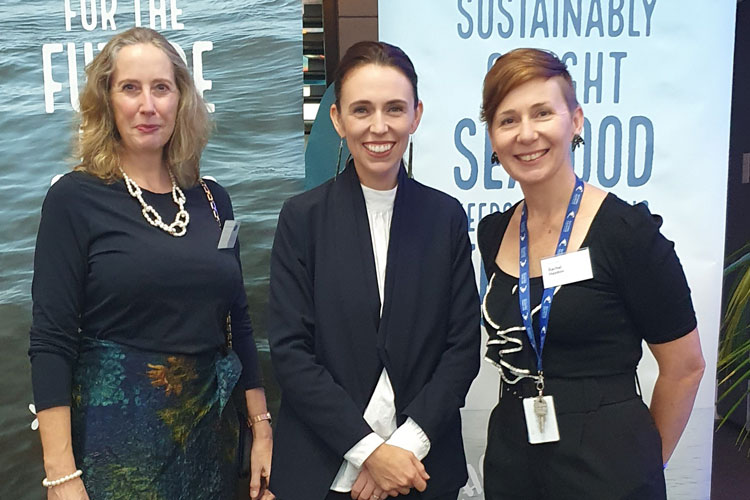
MSC Education Consultant; Perya Short with Prime Minister Jacinda Ardern and National Aquarium of New Zealand general manager Rachel Haydon.
<h2>International non-profit, the <a href="https://www.msc.org/en-au" target="_blank">Marine Stewardship Council</a> (MSC) and Napier City Council’s <a href="https://www.nationalaquarium.co.nz/" target="_blank">National Aquarium of New Zealand</a> have announced an ocean-centred science education partnership that is set to reach hundreds of schools across the country.</h2>
<p>Launched at an event at the National Aquarium of New Zealand in Napier on Thursday 11 March, the partnership includes new education resources for teachers and learners, a nine-topic series, <a href="https://www.msc.org/en-au/for-teachers/teach-learn-about-ocean-sustainability/new-zealand-education-curriculum" target="_blank">Te Kawa O Tangaroa</a>.</p>
<p>“Anything to do with the oceans and I’m there!” Said Prime Minister Jacinda Ardern during the event, where she spoke of the importance of every child should receiving education on how to care for our oceans.</p>
<p>In a video address delivered to delegates, Juliet Gerrard, Chief Science Advisor to the Prime Minister, added: <em>“I&#8217;m really excited at the depth and action focus of the resource. It&#8217;s really fantastic to have such a comprehensive portal that teachers and young people can go to really get inspired and redefine their relationship with the ocean and understand the actions that all of us can take to really make a difference for our mokopuna&#8217;s mokopuna.</em></p>
<p>Speaking about an upcoming report looking at the ocean and commercial fisheries, Gerrard, continued: “<em>The one thing that really gave us heart was talking to the younger generations of fishers and how they understood their ecosystem and their environments and how they wanted to innovate and do things better so that the ecosystem was more and more part of the thinking in how we fish. Resources like this are going to be absolutely pivotal in inspiring that next generation of fishers and of New Zealanders in general so that we have a shared vision for and appreciation of our incredible ocean.&#8221;</em></p>
<p>The resource that has been designed for teachers, by teachers are aligned to the New Zealand secondary school curriculum, with the aim of inspiring and educating young people about sustainable fisheries and empowering them to help ensure oceans teeming with life. </p>
<p>Talking about the importance of ocean literacy and sustainability, Anne Gabriel, Oceania Programme Director at the Marine Stewardship Council, said: <strong><em>“</em></strong><em>Our oceans are under immense pressure from pollution, climate change and overfishing. As we pass the baton to the next generation, education is key to generating greater understanding, urgency, and action to protect our big blue planet. </em></p>
<p><em>“Sustainable fishing is a non-negotiable imperative as the world’s appetite for seafood grows. If we are to continue to meet future demand, we must celebrate the uptake of sustainable fisheries management globally. Ultimately, we do this so our oceans continue to be resilient in their biodiversity, and so we can feed the billions of people who rely on seafood as their primary source of protein.”</em></p>
<p>The event highlighted the importance of long-term partnerships in delivering against the United Nations Sustainable Development Goals. Rachel Haydon, General Manager at the National Aquarium of New Zealand, said: “<em>The partnership between the National Aquarium of New Zealand and the Marine Stewardship Council unites our shared vision for oceans full of life, empowered consumers making the best choices they can, and sustainable practices embraced for generations to come.”</em></p>
<p><em>“Through the MSC’s curriculum and engaging experiences that facilities like the National Aquarium can provide, young people are encouraged to learn, connect to nature, and develop the confidence to make sustainable choices.”</em></p>
<figure id="attachment_18719" aria-describedby="caption-attachment-18719" style="width: 300px" class="wp-caption alignnone"><img class="size-medium wp-image-18719" src="https://www.schoolnews.co.nz/wp-content/uploads/2021/03/NANZ-4-300x200.jpg" alt="" width="300" height="200" /><figcaption id="caption-attachment-18719" class="wp-caption-text">Rachel Haydon, General Manager National Aquarium, Amy Stevens, Education Manager National Aquarium, Rika Milne, Learning Designer and Perya Short, Education Consultant, MSC</figcaption></figure>
<p>Guests, who also included Minister of Economic Development, Stuart Nash, and Napier City Mayor Kirsten Wise, experienced a special take on hoki fish fingers generously donated by Sealord. Napier chefs James Beck of Bistronomy and Luke Smith of Market Street shared their take on how to make this ingredient the hero of a dish. The MSC-certified sustainable “blue tick” hoki fish finger is a family-friendly and future-friendly seafood option.</p>
<p>Also taking place is the first of a series of free-to-attend one-day teacher training workshops. In these sessions, teachers learn about how to engage students on ocean related topics through presentations, tours, hands-on activities and lab-based experiments.</p>
<p>More information on the free teacher workshops, virtual classroom events and the full resource can be found at <a href="https://www.msc.org/tangaroa" target="_blank">msc.org/tangaroa</a>.</p>

EXCLUSIVE: Teachers used to be paid two to three times more than minimum wage workers,…
After an “overwhelming” vote to reject the latest Government offer, secondary school teachers will begin…
Second-language learning should be compulsory, says a new report from a forum bringing together academics,…
A new entitlement aimed to improve access to learning support coordinators for schools with students…
Educators have raised questions about the Ministry of Education’s new secondary school subjects, set to…
Professional learning and development (PLD) for teachers needs to be higher impact for teachers and…
This website uses cookies.